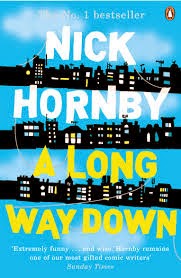Gottlieb, Eli. Now You See Him. New York: HarperCollins. 2008. Print.
First Sentences:
In such a time of dark views and darker diagnoses, I'll forestall all second-guessing and declare it up front: I loved him.
Description:
If this book interests you, be sure to check out:
Gottlieb, Eli. Best Boy
McNeil, Tom. Goodnight, Nebraska
At this late date, would it be fair to say that people, after a fashion, have come to doubt the building blocks of life itself?That we suspect our food? That we fear our children? And that as a result we live individually today atop pyramids of defensive irony, squinched into the tiny pointed place on the top and looking balefully out at the landscape below?
In such a time of dark views and darker diagnoses, I'll forestall all second-guessing and declare it up front: I loved him.
Description:
In the opening pages of Now You See Him by Eli Gottlieb, Rob Castor, a briefly famous author, has killed his writer/girlfriend and then himself. Six months later, these brooding, psychological actions are examined by Rob's best friend, Nick Framingham, who is still deeply enmeshed in the circumstances of these two deaths.
Nick gradually recalls past incidents and decides to delve into the lives of those who might help him overcome his bereavement and withdrawal from the current world. They might also help his wife who cannot understand his six-month obsession over a minor writer and distant friend. Nick even tracks down Castor's mother and sister who once lived across the street from his in his childhood, but his interviews with them have unforeseen consequences. Conversations with Nick's parents also reveal dark secrets that complicate Nick's understanding of his own life and his own possible connection to the murder/suicide.
Gottlieb is a masterful writer or prose. His descriptions of Nick, his wife, and Castor drive this story onward, uncovering personal demons and judgments that can only lead to sadness. Some examples of his compelling writing?
The story is gripping, the narrator both sensitive and idiotic in his personal choices, and the writing always first-rate. Plot, character, and style: Now You See Him has the big three elements of any great read.
He was a deep friend ... part of the landscape of ancient memory, and I loved him the way you love an old land formation like a pier or jetty off which you remember jumping repeatedly into the cool, blue, forgiving water.Written as a stream of consciousness, Now You See Him follows Nick as he tries to unravel incidents and people that might have led to these deaths. But Nick's overwhelming concern for his childhood friend and murders soon affects his relationships with his own wife and family, friends he shared with Castor, as well as Castor's surviving family.
Nick gradually recalls past incidents and decides to delve into the lives of those who might help him overcome his bereavement and withdrawal from the current world. They might also help his wife who cannot understand his six-month obsession over a minor writer and distant friend. Nick even tracks down Castor's mother and sister who once lived across the street from his in his childhood, but his interviews with them have unforeseen consequences. Conversations with Nick's parents also reveal dark secrets that complicate Nick's understanding of his own life and his own possible connection to the murder/suicide.
Gottlieb is a masterful writer or prose. His descriptions of Nick, his wife, and Castor drive this story onward, uncovering personal demons and judgments that can only lead to sadness. Some examples of his compelling writing?
- The city of New York tosses up so much noise and light that it's easy to pretend you're busy and convince everybody else of it as well, even if you're sitting all day in a box of squared failure and staring out a window waiting for the phone to ring.
- The interior of the house had that creepy feeling you sometimes get when everything is like it once was, but shadowed and webby with age, and you realize you've stepped into the end of someone's story that was once the beginning of yours, and that fact can't help but make you thoughtful, and a little sad as well.
- Truth, at least marital truth, is curved, not straight. It's more easily reached through sidelong glances than the burning heartfelt stare. It responds to inference better than it does to blunt disclosure, and sometimes is happiest being tastefully burning in the backyard.
- When we finally fell into each other's arms, there was a touch of relief as well -- relief at the thought that the entire humiliating audition of running to and fro in the world with your heart in a lockbox, praying for a loving soul to find the key, was over.
- Cruelty is not a religion, even when practiced diligently and with faith.
Maybe the best, most passionate love always breeds its own extinction.
If this book interests you, be sure to check out:
Gottlieb, Eli. Best Boy
An autistic man who has spent four decades in a medical facility for damaged people, decides to leave and return to his boyhood home. (previously reviewed here)
McNeil, Tom. Goodnight, Nebraska
Randall Hunsacker is moved to the tiny town of Goodnight, Nebraska after witnessing the death of his father, nearly dying on the football field, and killing his step-father. A coming-of-age story like no other, full of compassion, anger, and solitude. (previously reviewed here)

